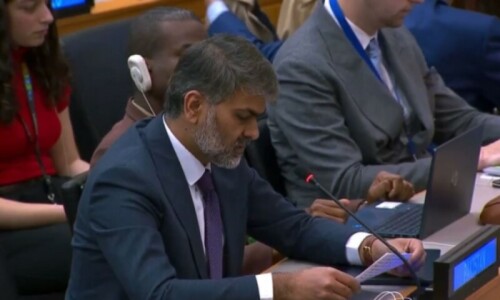ISLAMABAD: The Supreme Court concluded on Friday that the process of appointment of a judge in the superior court would be considered complete only after he took the oath of his office as prescribed under the Constitution or the prestigious office would remain vacant.
“A person can only enter the office of a judge when he makes oath in the manner set out in the constitution of 1973,” decreed Justice Sheikh Azmat Saeed in a detailed judgement he authored.
“In the absence of such oath, the person has not entered the office of the judge and his appointment does not stand completed and concluded,” Justice Saeed observed while settling the seniority controversy among the judges of the Lahore High Court.
Justice Saeed was heading a five-judge Supreme Court bench. The case at hand pertains to the seniority dispute highlighted by Justice Mohammad Farrukh Irfan Khan of the Lahore High Court in 2016. Consequently, Justice Khan, who is facing a reference before the Supreme Judicial Commission (SJC), will remain a junior judge to two seniors before him.
Justice Khan had requested the Supreme Court to set aside the Nov 26, 2016 administrative order of then chief justice of the LHC Mansoor Ali Shah which, according to the appellant, had disturbed inter-se-seniority of the judges of the batch appointed on Feb 17, 2010, thus relegating Justice Khan’s seniority.
Earlier on Oct 18, 2018, the Supreme Court had rejected the petition of Justice Khan, but issued the detailed order on Friday in which it upheld the Nov 26, 2016 administrative order of then chief justice Shah, who relegated Justice Khan, though previously he was shown senior to Justice Mohammad Qasim Khan, Justice Syed Mazahar Akbar Ali Naqvi and Justice Mazhar Iqbal Sidhu. Justice Sidhu has resigned against the backdrop of a reference before the SJC.
In his petition, Justice Khan had pleaded that he was being shown junior to these judges on the basis of an administrative order which, according to him, was illegal.
In the detailed judgement, Justice Saeed cited the Supreme Court Bar Association case verdict in which it was held that taking of oath had been referred to as the final stage of an appointment and that the appointment of the judge consisted of five stages commencing with recommendation and ending on taking the oath.
“The choice of words used in Article 194 of the Constitution suggests that a person enters the office of the judge or an additional judge upon making the prescribed oath,” Justice Saeed observed, adding that this provision implied that till such oath was taken, it would be considered that the person had not entered the office of the judge and the office would remain vacant.
“This provision becomes even more obvious when Article 194 of the Constitution is examined in the context of the Supreme Court Bar Association case judgement and it is apparent from the observation highlighted that there is a legal possibility of withdrawal of a notification for appointing judge prior to his taking the oath,” the judgement said. Article 209 of the Constitution protected the tenure of office of the judge, including the additional judge who could only be removed through the Supreme Judicial Council, Justice Saeed observed, adding that if after the issuance of the notification the person mentioned was in law a judge, there could be no possibility of withdrawal of the notification in view of Article 209 of the Constitution, which left no doubt that the person was not, in fact, or in law a judge until and unless he took the oath of his office in terms of Article 194 i.e. the final stage of his appointment.
Published in Dawn, March 23rd, 2019















































